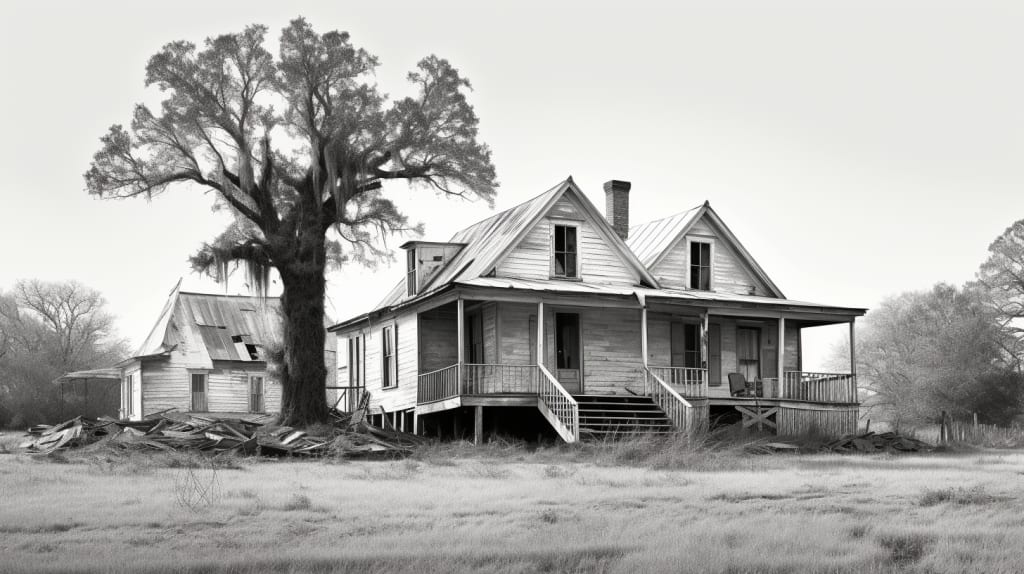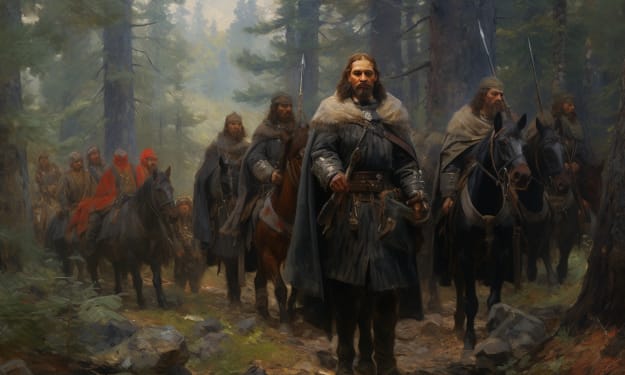The Tyranny of Progress in “Everyday Use” and “Dead Men’s Path”
a literary analysis

[Author's Note: These two classic short stories are the subject of the article. If you are not familiar with these works, you owe it to yourself to read them.]
- "Dead Man's Path" by Chinua Achebe
- "Every Day Use by Alice Walker
----------------------------------------------------------------------------------------
The character of Dee in Alice Walker’s “Everyday Use” and the character of Michael Obi in Chinua Achebe’s “Dead Men’s Path” share an adherence to what they consider a progressive ideology, putting them into conflict with those around them, while their perceptions of tradition give differing shapes to their relationships within those conflicts. This struggle between traditional and progressive mindsets is the dominant theme in both Walker’s and Achebe’s short story. In their respective stories, Dee serves as antagonist and Michael as protagonist, but they each represent the progressive side of their stories’ conflicts.
The intertwined relationship between modern education and progressivism is apparent in both “Everyday Use” and “Dead Men’s Path”. In each story, it is evident that Dee and Michael have developed their progressive ideals within the context of their higher education. This is illustrated more subtly in the case of Dee, while Michael as an educator, is more explicit in tying together formal education and the propagation of progressivism. Returning home after a prolonged absence at college, Dee self-consciously displays a façade of enlightenment. For Michael’s part, he relishes the chance to prove himself at the Ndume Central School, which has “always been an unprogressive school” (Achebe par. 1).
Michael and Dee, presumably, owe their enlightenment to their education. Growing up, Dee was the more intellectually inclined member of her household. As her mother states it, she “burned us with a lot of knowledge we didn’t necessarily need to know” (Walker par. 11). Her intellectual bent set her apart from her mother and sister early on, but after going off to university, this blossomed into a more developed ideology of progress and enlightenment. As for Michael Obi, he too became so enlightened by his education that he found himself set “apart from the other headmasters” (Achebe par. 1). The “narrow views of these older and often less-educated ones” elicits Michael’s disdain (Achebe par. 1). This setting apart, this distancing of oneself from others and the past, seems to be a hallmark of a progressive education on both sides of the Atlantic.
Though it is not at all apparent to either character, the result of all this education seems to be a false enlightenment. One must conclude that they are blissfully lacking in self-awareness, since what they perceive as their own enlightened and progressive superiority has done little more than alienate them from their people and cultures. In the lives of Michael and Dee, neither local shamans nor one’s own family members are immune from the tyranny of their progressivism. Dee’s caustic bullying and Michael’s condescending dismissal of an entire village’s religious beliefs, though they vary in degree of subtlety, are merely attempts to domineer their intellectual inferiors. Secure in the correctness of his ideology, Michael has no problem in sarcastically informing the village priest that “dead men do not require a footpath” (Achebe par. 24). It seems irrelevant to him that he is outnumbered in a village of people who strongly believe that, indeed, dead men do require a footpath. Any foreshadowing of things to come contained in the priest’s response that, “if you reopen the path we shall have nothing to quarrel about” was lost on Michael (Achebe par. 25).
In her attempt to latch onto the family quilts, Dee is bold enough to declare outright about her sister that “she’d probably be backward enough to put them to everyday use” (Walker par. 65). “Maggie knows how to quilt”, according to Mama (Walker 69) and exhibits a working knowledge of her family’s history (Walker par. 52). Yet, it is Dee who dares to denounce her mother and sister for not “understanding” their heritage (Walker 81).
It is their more traditional views, of course, that make all these people intellectually inferior, rather than any objective lack of intelligence. The irony of both Dee’s and Michael’s progressive ideology is that, while they see it as a source of upliftment, in practice, it does little more than cause harm and offense. By being inflexible and lacking empathy for anything resembling tradition, they isolate themselves not only from their heritage but from their family and neighbors. In Dee’s case, this results in further estrangement from her family. After waiting so long to see her once again, they were happy to see her go in the end. Once she had gone, they just “sat there enjoying” (Walker 83). Michael suffered professionally for his failures. The “white supervisor” he had so hoped to impress, scathingly accused Michael of fueling a “tribal war situation…between the school and village” (Achebe 29).
For all their similarities, Dee and Michael have some striking differences in how they view traditionalism and, also, in their ideological relationship to the “establishment”. These differences may be chalked up, in part, to regionalism, reflecting the unique times and cultures in which the writers and their stories find themselves. Dee says that she “couldn’t bear it any longer, being named after the people who oppress me” (Walker par. 26). By contrast, Michael worked for a white, missionary establishment and was quite anxious to impress them (Achebe par. 1).
The very relationship to traditionalism takes different forms in “Everyday Use” and “Dead Men’s Path”, which further reflects a difference in local culture. Dee makes a conscious effort to embrace her African heritage, but this does not represent any true appreciation for tradition. Declaring that Dee is “dead”, essentially, cuts her off from her roots (Walker par. 27). It would take more than arbitrarily choosing to be “Wangero Leewanika Kemanjo” to tap into the African heritage she claims to embrace (Walker par. 25). In reality, it is Dee’s family that has maintained the traditions and heritage passed through the preceding generations, but Dee has little use for this living tradition. Only in the most superficial terms does she show any acknowledgment of this tradition, such as coveting the quilts as if they were museum pieces. Another example of this false appreciation is seen as she takes pictures of her family and their home as if they were part of some display, rather than something she was indelibly connected to (Walker par. 23). What Dee does not see is that the traditionalism of her family is the very thing which, ultimately, connects her to her African heritage.
Michael Obi is in Africa and does not have the same historical backdrop as Dee. His perception of what constitutes traditionalism versus progressivism seems less muddled. He has unabashedly chosen the side of progress. When confronted with the traditional beliefs of the villagers, Michael proclaims that it is “our duty to teach your children to laugh at such ideas” (Achebe par. 24). As he explains to the local priest, “the whole purpose of our school…is to eradicate just such beliefs as that” (Achebe par. 24). Michael might as easily borrow a line from Dee, when she declares to her sister that “you ought to try and make something of yourself, too, Maggie. It’s really a new day for us” (Walker par. 81). Clearly, for Michael, education is about more than academics. His primary motivation is to advance a particular ideology that has no room for traditional beliefs and values. Education is the means to that end. Whether in Mississippi, or Nigeria, backward people like the priest, or Maggie, have little place in a progressive future. Whether symbolized by paths, or quilts, such people are merely obstacles to be overcome.
Despite their self-satisfied progress and enlightenment, both Dee and Michael lack a basic ability to relate, or empathize, with others. While they may have acquired education, they have not acquired wisdom. This “progress” of theirs is a form of tyranny, where they subtly (and not-so-subtly) oppress those around them with their patronizing, condescending, and insulting behavior. Their self-evident superiority blinds them to the effect their behavior has on other people and, in some cases, on themselves. Dee leaves her family feeling fully entitled and oblivious to the inappropriateness of her behavior. When Dee dons her “sunglasses that hid everything above the tip of her nose and her chin”, it serves as a smug parting gesture (Walker par. 82). When Michael awakes to find his campus trashed, it does not have to be explicitly stated to know that he was genuinely taken aback (Achebe par. 29). In his arrogance, it could have never occurred to him that he might suffer consequences for his uncompromising and uncharitable attitude.
Under the tyrannical rule of progress, compliance is expected, and end results are considered a foregone conclusion. Of course, not everyone chooses to submit. Some, like Mama and Magee, choose to passively ignore it and get on with their lives. Others, like the villagers of “Dead Men’s Path” choose a more direct approach. This is a lesson that Michael Obi learned the hard way. At the climax of “Everyday Use”, Dee remains mostly indignant, having been rebuffed over the quilts, but it is not difficult to imagine a coming day when she faces more serious consequences for her intolerance. Tyranny may demand compliance, but it does not always get it.
----------------------------------------------------------------------------------------
Works Cited
Achebe, Chinua. “Dead Men’s Path”. Backpack Literature: An Introduction to Fiction, Poetry, Drama and Writing, edited by X. J. Kennedy and Dana Gioia, 5th ed., Pearson, 2016. pp. 187-190.
Walker, Alice. “Everyday Use”. Backpack Literature: An Introduction to Fiction, Poetry, Drama and Writing, edited by X. J. Kennedy and Dana Gioia, 5th ed., Pearson, 2016. pp. 77-84.
About the Creator
Randy Baker
Poet, author, essayist.
Enjoyed the story? Support the Creator.
Subscribe for free to receive all their stories in your feed. You could also pledge your support or give them a one-off tip, letting them know you appreciate their work.
Reader insights
Outstanding
Excellent work. Looking forward to reading more!
Top insights
Compelling and original writing
Creative use of language & vocab
Easy to read and follow
Well-structured & engaging content
Eye opening
Niche topic & fresh perspectives
Heartfelt and relatable
The story invoked strong personal emotions






Comments (3)
Achebe's short stories are fascinating: they could be oral folktales born millennia ago, but he wove contemporary threads into them all. More serious writing about literature is always wonderful to see here, complete with an MLA Works Cited list!
Interesting analysis! And written so well! I think I’m most interested in reading ‘Dead men’s path’
Incredible work! Keep it up!🥰